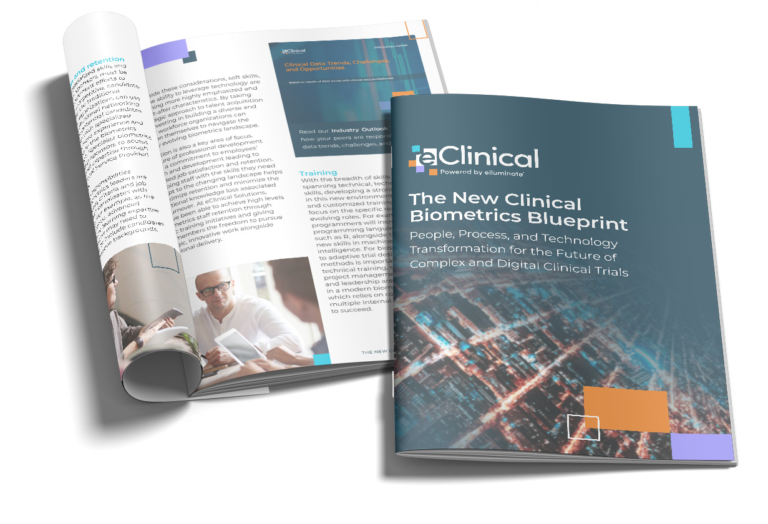
Understanding Market Perceptions of Risk-Based Approaches in Clinical Research – DIA 2023 Research Summary
At DIA 2023, the global annual meeting of the Drug Information Association (DIA), the eClinical Solutions team wanted to get a better understanding of how attendees viewed the use of risk-based approaches. In clinical trials, risk-based approaches help teams focus attention on the critical data and processes, and any component of a trial that could impact patient safety, or negatively affect trial outcomes. This approach helps researchers identify and fix potential issues before they become more significant. Cost is also a driver of risk mitigation. To gauge perception of risk-based monitoring (RBM), risk-based quality management (RBQM), and risk-based data management (RBDM), the eClinical Solutions team developed a brief survey and questioned respondents during booth visits over the course of the conference.
Survey Demographics
Respondent roles included clinical operations, regulatory compliance, patient safety, and executive management. Nearly two-thirds of respondents (65.4%) represented Sponsor organizations while the rest were split somewhat evenly between CROs (Contract Research Organizations), Technology companies, Consultants, General Healthcare, and Other/Undefined.
Survey Demographics Details
- Sponsors – 65.4%
- CRO – 7.7%
- Technology – 7.7%
- Consultancy – 7.7%
- Healthcare – 3.9%
- Other – 7.7%
Survey Results and Key Takeaways
The following survey questions were developed to get a better sense of attendees’ perspectives regarding risk-based approaches in research. Specifically, the eClinical Solutions team sought to know more about barriers to adoption, beliefs about chief benefits of risk-based approaches, and how comprehensively attendees had already implemented risk-based approaches at their organizations.
Question: What do you believe is the biggest barrier to adoption of risk-based approaches in the clinical trials industry?
- Cost – 38.5%
- Lack of Expertise – 23.1%
- Resistance to Change – 19.2%
- Technology Limitations – 11.5%
- Regulatory Uncertainty – 7.7%
The perception that implementing risk-based approaches is costly is a primary concern, with over a third of respondents citing cost as the strongest barrier to adoption. Other strong concerns included the feeling that internal teams lacked the expertise necessary for successful implementation and an overall resistance to change, in general. Solutions that ensure positive return on investment (ROI), along with offering streamlined integration strategies will be crucial for addressing hesitancy.
Question: In your view, what is the biggest benefit of implementing risk-based practices in clinical trials?
- Improved Data Quality – 38.5%
- Patient Safety – 23.1%
- Reduced Costs – 15.4%
- Increased Efficiency – 15.4%
- Regulatory Compliance – 3.4%
- Ability to Handle Data Complexity – 3.4%
Despite the concerns noted in their earlier answers, respondents clearly showed an understanding of the chief benefits of risk-based approaches. Nearly 40% cited improved data quality as the strongest benefit of risk-based practices and over 20% pointed to improvements in patient safety. The perception of high cost, the number one concern over adoption, was slightly contradicted here, as 15% of respondents acknowledged that RBQM can help to reduce costs. Solutions that help realize these cost efficiencies, while also supporting the need to improve data quality and patient safety can help customers move closer to fuller adoption.
Question: To what extent has your organization integrated risk-based practices including risk-based monitoring (RBM) risk-based quality management (RBQM) and risk-based data management (RBDM) into your clinical trials?
- Limited Integration of Risk-based Components – 30.8%
- Not Applicable – 26.9%
- Partial Integration of Risk-based Components – 19.2%
- Comprehensive Integration of All Risk-based Components – 11.54%
- Not Sure – 11.54%
A little over 60% reported at least some level of integration. Among respondents, however, comprehensive integrations were still rare. All of this indicates that the opportunity for expansion of risk-based approaches is high, but the benefits must be reiterated. In addition, access to the right expertise, and practical strategies to enable incremental adoption can support fuller integration across organizations.
Conclusions
Knowledge and enthusiasm around the benefits of risk-based approaches exists in contradiction to perceptions around the chief barriers to adoption. Nowhere is this more evident than when looking at the issue of cost. While some respondents looked to cost reduction as a primary benefit of risk-based approaches, the majority chose cost as the number one barrier to implementation.
Those surveyed also demonstrated a recognition that RBM, RBQM, and RBDM helps to make several key performance improvements including data quality, patient safety, regulatory compliance, overall efficiency, and the ability to handle increasingly complex data. Despite this, very few reported more than limited integration of risk-based approaches at their organizations.
Customers are looking for RBQM solutions that are relatively simple and cost-effective to integrate. Solutions that provide strong ROI, along with robust training and implementation support are ideal for helping more researchers realize the value and benefits of risk-based strategies.
Part of the elluminate® Clinical Data Cloud, elluminate RBQM provides a broad set of capabilities to monitor and mitigate risk across all clinical trial data sources from a single platform, providing a holistic view of risk and comprehensive data to feed Key Risk Indicators (KRIs). eClinical Solutions’ Biometrics Services team applies modernized processes and technologies enabling them to work more efficiently with the increasing volume and variety of data, applying risk-informed strategies alongside AI/ML approaches.
To learn more about how risk-based approaches, along with other essential people, process and technology transformations are shaping a new clinical biometrics blueprint, download our latest ebook.
The New Clinical Biometrics Blueprint
Author

Liz Cole has over 25 years’ experience in commercial roles within the biopharmaceutical sector with a particular focus on clinical data transformation, innovative trials, and advanced analytics. At eClinical Solutions, Liz is responsible for Biometrics Services’ marketing strategy, planning, product messaging, and content.
By submitting, you agree to the processing of your personal data by eClinical Solutions as described in our Privacy Policy.








